|
|
| |
 Biography:
Biography:
|
 |
|
The Human League are a British New Wave band. They first formed
in 1977 and, after a change in line up, achieved huge popularity
in the 1980s. They have continued recording and performing with
moderate commercial success in the 1990s and 2000s.
Originally a synthesizer-based group from Sheffield, the only
constant band member since the Human League formed in 1977 is
vocalist and songwriter Philip Oakey. Today, the Human League
still are recording and performing. The group now is presented
as a trio of Oakey and long-serving female vocalists Joanne
Catherall and Susan Anne Sulley.
Over the years, the Human League has been sampled and covered by
various artists including George Michael and Robbie Williams.
The band has been a huge influence for many electro-pop acts
including early Depeche Mode, Madonna, Moby, and other bands. |
|
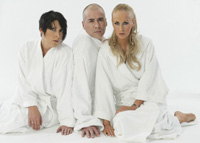
|
|
|
|
|
|
The
Beginning |
|
|
Martyn
Ware and Ian Craig Marsh were both working as computer operators in
1977, and combined a love of pop music (such as glam rock and Tamla
Motown) with avant garde electronic music. They acquired a Roland
System 100 synthesizer and began to create music in their own
rehearsal facility. Initially they formed a group called The Future
with Adi Newton. Newton left to form the outfit Clock DVA. Ware and
Marsh searched for a vocalist, but their first choice, Glenn Gregory
(who would be the lead singer of their later band Heaven 17), was
unavailable. Ware instead decided to invite Philip Oakey, an old
school friend, and a hospital porter at the time to join the band, "apparently
by leaving a note stuck to his door". Oakey accepted the invitation,
despite never having been in a band before. Shortly after, they
decided to call themselves "The Human League." A collection of demos
from this period was released on CD in 2002, titled The Golden Hour
of The Future, compiled by Richard X.

|
|

|
The name "Human League" derived from the game Starforce: Alpha
Centauri, which was the second professionally published science
fiction wargame, by SPI. In the game, the Human League arose in 2415
A.D., and were a frontier-oriented society that desired more
independence from Earth and the terraforming of systems not
naturally habitable.
In addition to Ware, Marsh and Oakey, the band recruited
photographer Philip Adrian Wright to run slide shows and films
onstage, and was credited as a full band member on record sleeves
despite his contributions being non-musical.
The band released their debut single "Being Boiled" in 1978 on
Edinburgh's Fast Product label.
The original line-up released two LPs that were mildly successful:
Reproduction in 1979 and Travelogue in 1980. Both reached the Top 40
of the UK Album Charts (though Reproduction did not achieve this
until two years after its release).
After the release of Travelogue, disillusionment with the band's
limited success, particularly after contemporary Gary Numan's "Cars"
single became a smash hit, led to the breakup of the band's original
lineup in late 1980, with Ware and Marsh eventually forming Heaven
17 with vocalist Glenn Gregory and Oakey retaining legal rights to
the Human League name, in exchange for royalties paid to Ware and
Marsh for future band revenues.

|
|
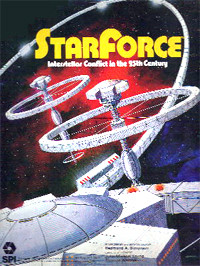 |
|
1980s |
|
|
Following the split of the original line-up, Wright and Oakey
released another fringe single, "Boys and Girls". In order to fulfil
their European tour commitments, they recruited bass player Ian
Burden, and fronted the band with two singers, Susanne Sulley and
Joanne Catherall, schoolgirls whom they had met in Sheffield's Crazy
Daisy Nightclub, and managed to complete the tour.
In 1981, Virgin records paired them with former Stranglers producer
Martin Rushent, and the first result was the single "The Sound of
the Crowd", which saw them at last achieve success in the singles
chart. Guitarist Jo Callis (formerly of The Rezillos) was now
recruited to the band, and with Rushent at the helm, The Human
League recorded their most successful album to date, Dare!. It
achieved huge success, fuelled by its further hit singles, "Open
Your Heart", "Love Action"/"Hard Times" and most famously "Don't You
Want Me", which reached number one in the UK charts during the
Christmas of 1981 and was one of the biggest selling singles of that
year, and it also charted at number one in the US during the summer
of 1982. These three releases were accompanied by striking promo
videos ("Love Action" based on the movie The Graduate).
In the summer of 1982, a remix album of Dare entitled Love and
Dancing was released under the group name League Unlimited Orchestra,
reaching number three on the UK album chart. During their Dare phase,
the Human League were often associated with New Romantic movement.
In November 1982, the Motown influenced electro pop single "Mirror
Man" reached number two in the UK chart. The follow-up single
released during April 1983, "(Keep Feeling) Fascination" similarly
peaked at number two. The following months proved to be difficult
ones for the band as they struggled to record a follow up to Dare. A
six song EP called Fascination! compiled the singles "Mirror Man"
and "Fascination" together with the new track "I Love You Too Much"
from the original recording sessions for their new album, later to
be named Hysteria. The EP was released in America as a stop-gap and
also became a strong seller as an import in the UK.
The band spent many expensive months agonizing over each and every
sound recorded as the band tried to follow up Dare, and as things
became ever more stressful the producer Martin Rushent left the
project, at which point the band ditched much of the material
recorded so far and started over again with new producers Hugh
Padgham and Chris Thomas (though some of Rushent's contributions to
certain tracks from the earlier sessions were included on the
released album). Finally in May 1984 the band released the
politically charged single "The Lebanon". Its rock guitar-driven
harder edge was a considerable and surprising departure from their
previous material, and the single peaked at number eleven in the UK.
This was followed shortly after by the album Hysteria, so called
because of the difficult and tense recording process, it entered the
UK charts at number three however it climbed no further and critics
and fans were divided by the new direction the band had taken. The
second single was the rather downbeat "Life On Your Own", with its
opening line of "winter is approaching, there is snow upon the
ground" making it a strange choice of single to be released in the
middle of summer. Again the single missed the UK top ten reaching
number sixteen, and with the parent album Hysteria failing to live
up to expected sales thoughts of a third single were put on hold.
However, later that year, Oakey enjoyed huge success outside of the
Human League with the hit single "Together in Electric Dreams", a
collaboration with one of his idols, synth pioneer Giorgio Moroder.
The track was taken from the film soundtrack to Electric Dreams and
became a massive hit around the world. The pair then recorded an
album for Virgin, Philip Oakey & Giorgio Moroder, which met with
less success, with the two subsequent singles failing to make the UK
Top 40. However, the success of the first Oakey and Moroder track
encouraged the Human League's record label to release one final
single from Hysteria in November 1984: the ballad "Louise" (UK
number 13).

|
|


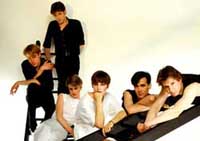
|
In 1986,
the group found themselves in creative stagnation, struggling to
record material to follow up on their previous success. Key
songwriter Jo Callis departed, replaced by drummer Jim Russell, and
Virgin paired the Human League up with cutting-edge American R&B
producers Jimmy Jam and Terry Lewis who had just scored a huge
worldwide hit earlier that year with Janet Jackson's Control. The
result was the Crash album. The album featured much material written
by Jam and Lewis' team, and showcased their distinctive DX7-led
sound, making it quite a departure from previous Human League
material. It did provide an American number-one single, "Human", but
other singles made smaller chart impact.
In November 1988, a greatest hits compilation album was released
which reached number 3 in UK.

|
|
 |
|
1990s |
|
|
In 1990,
the band released their last album for Virgin Records, Romantic?.
Longstanding members Adrian Wright and Ian Burden, together with
newer recruit Jim Russell, had by now left the band (although Jo
Callis did return to play on some of the sessions and co-wrote two
songs, including the minor hit single "Heart Like a Wheel"). New to
the line-up were keyboardist Neil Sutton (who co-wrote over half the
album's songs), and guitarist/keyboardist Russell Dennett, who (along
with Oakey) made a cameo appearance in Reeves & Mortimer's 1992
comedy TV pilot The Weekenders, playing in a club as "Electric
Russell". The Romantic? album did not re-capture the group's huge
commercial success of 1981 (with its second single "Soundtrack to a
Generation" barely charting), and Virgin chose not to renew their
recording contract with little warning causing great animosity
between the company and the band that lasts to this day.
The Human League returned in 1995, now signed to EastWest, with the
single "Tell Me When" giving them their first major hit since 1986's
"Human", and the accompanying album Octopus going silver. On the
album credits, cover artwork and in videos, the group was now
presented simply as a trio of Oakey/Catherall/Sulley. In reality
however, half a dozen other musicians had input to the record,
including producer Ian Stanley (former Tears for Fears keyboard
player), continued playing and songwriting contributions from Neil
Sutton and "Electric Russell" Dennett, and Oakey co-writing one
track with Jo Callis. The next single from the album, "One Man in my
Heart" (sung by Sulley), and a remix of "Don't You Want Me", were
also UK hits, however the subsequent "Filling up with Heaven" and
the non-album "Stay With Me Tonight" (from the greatest hits
compilation in 1996) barely made the UK Top 40. A follow up to
Octopus was slow to materialize and a subsequent change in
management at EastWest saw the cancellation of the band's contract.

|
|
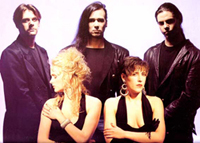
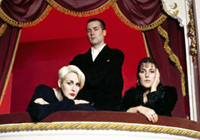 |
|
2000s |
|
|
The band
did not release their next album, Secrets, until 2001. The band was
still presented as the "Phil & the girls" trio, although Neil Sutton
was credited with keyboards, and co-wrote most of the material with
Oakey. Despite being extremely well received by critics (the music
climate at the time seeing a new interest in electronic pop music
with the electroclash movement), the band's new record label,
Papillion (a subsidiary of Chrysalis Records), was closed by the
parent company shortly after the album's release, leading to poor
promotion and sales. UK radio stations also refused to play "All I
Ever Wanted" because, now in their 40s, the band didn't match the
radio stations' self-imposed demographic target audience. Secrets
hit number 44 on the UK album chart in its first week but was absent
from it the following week. Susan Sulley is on record as saying that
the rejection of Secrets was the lowest the band had been since 1991
and nearly caused them to call it a day.
Throughout the years following, the band have continued to tour,
enjoying success as a live act, and releasing a DVD of Brighton show
in 2003. In the last few years they have participated in a couple of
'80s revival tours, whilst more often going out on the road on their
own, playing their many top-ten hits to packed houses throughout the
UK and frequently further afield.
On September 22, 2006, the band performed on the ABC television
show, Jimmy Kimmel Live. The highlight of 2006 was the band playing
to an audience of 15,000 at the Hollywood Bowl, Los Angeles in
October, this was followed up by an 11 venue tour of the UK and
Europe in November and December.
In the free UK newspaper Metro in December 2006, Oakey stated that
the band's project for 2007 would be to record new material, with
Sulley later confirming to the The Falkirk Herald newspaper in May
2007 that a new album would be released in her words 'in the near
future'. The band also continue with their core business of playing
live, with appearances at a number of key music festivals in the UK
and Europe during 2007, at many of which they are the advertised
headliners.
The Human League marked their 30th anniversary with a special "Dare
Tour" in December 2007 where they played their most successful
album in it's entirety, to start the set list.
In 2008 the band teamed up with 2 other Sheffield based bands; ABC
and Heaven 17 and toured the UK under the banner: Steel City Tour.
In 2009 they signed a deal with Wall of Sound, and writing and
recording new material.

|
|
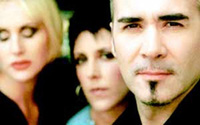

2007-2010
Live line-up |
|
Today |
|
|
|
The
Human League are currently signed to the Wall of Sound label, and
have released the first single 'Night People' as a digitally single,
followed by a 12" single. They went on a 'Night People' tour in the
UK to promote the single. In March 2011 the album 'Credo' will be
released.
The current
band line-up is as follows:
Philip Oakey - Vocals, since 1977
Susan Anne Sulley - Vocals, since 1980
Joanne Catherall - Vocals, since 1980
Neil Sutton - Keyboards, since 1990
Nic Burke - Multi-instrumentalist, since 2001
Rob Barton - Percussion, since 2001
David Beevers - On-stage engineering, since 1990

Edited text from
Wikipedia - for full article click here.
(thanks to
Andy Mac Giolla Eoin).
|
|
 |
|
 |
|
|
 top top |
|
 Copyright © 2011
www.humanleague.dk Copyright © 2011
www.humanleague.dk |
|